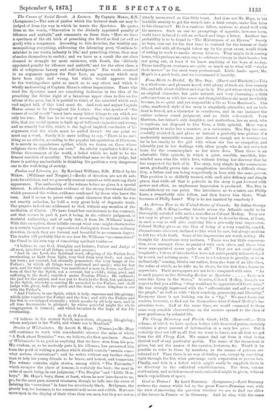The Causes of Social Revolt. A Lecture. By Captain Masse,
R.N. (Longmans.)—The sort of justice which the lecturer deals out may be judged of from the way in which he treats the Spectator. He quotes from us the words, "Starvation is the divinely appointed penalty of idleness and unthrift," and comments on them thus, " Hero we have a specimen of the old trick of preaching the Devil as God (or evil as ,good) with a vengeance. According to this doctrine, the wealthy say, monopolising everything, addressing the labouring poor, 'Continuo to minister to our wants, industry is life,' and preaching virtue, they may -abandon themselves to surfeit ; and we have as a result the one class doomed to struggle for mere existence, with Death, the divinely appointed penalty for idleness and unthrift,' and for the other class, a life of voluptuous luxury and self-indulgence." The words occurred in an argument against the Poor Law, an argument which may have been right and wrong, but which would approve itself to the working-class quite as much as to any other, and which is wholly undeserving of Captain Masse's odious imputations. Those who read the Spectator must see something ludicrous in the idea of its preaching the divine right of a luxurious upper class to live on the labour of the poor, but it is painful to think of the mischief which rash and unjust talk of this kind must do. And rash and unjust Captain Maxso seems to be throughout his lecture. One who speaks of the causes of social revolt" must have many bitter things to say which are only too true. But has he no way of accounting for national evils but this, that our social system is built up of deliberate injustice and wrong, and no remedy but this, which is the logical implicit conclusion of his argument, that the whole must be pulled down ? On one point we must say a word. Surely it is mere trifling to say, "There is no such thing as an atheist, according to the popular interpretation of this term. It is merely an opprobrious epithet, which we fasten on those whose religious views differ from our own." An atheist repudiates belief in a Divine Government of the world, a belief which we hold to be the firmest sanction of morality. _ The individual man we do not judge, but there is nothing uncharitable in thinking his position a very dangerous one to the well-being of society.






























 Previous page
Previous page